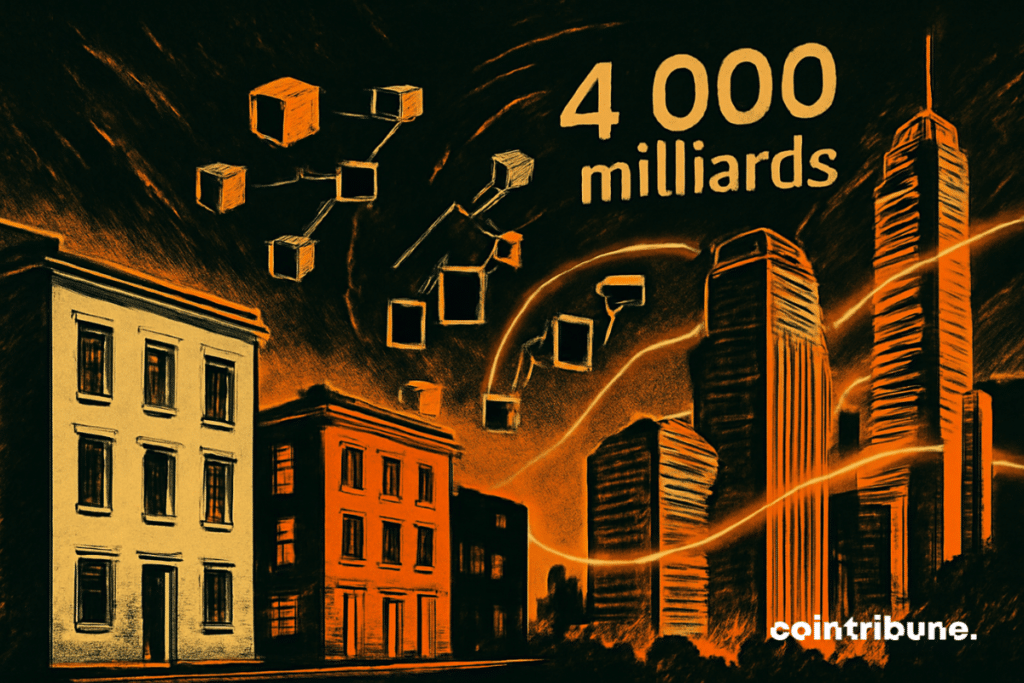According To Deloitte, Tokenized Real Estate Will Exceed $4 Trillion By 2035.
The global economy is undergoing a major transformation with the advent of blockchain, and real estate is not exempt from this revolution. Deloitte predicts that tokenized real estate will reach 4 trillion dollars in assets by 2035. This impressive figure highlights a profound change in real estate investment, which is becoming more accessible and more liquid. Tokenization is redefining the rules of the real estate market, opening up new possibilities for a more decentralized global economy.

In Brief
- Tokenized real estate could reach $4 trillion by 2035 according to Deloitte.
- Blockchain is making real estate investment more accessible.
- Regulatory, legal, and cultural challenges remain major hurdles for widespread and secure adoption.
- If these obstacles are overcome, tokenized real estate could account for 10% of the global market by 2035.
Tokenized Real Estate: A Revolution Accessible to All
Tokenized real estate represents much more than just a technological innovation. By fractionalizing physical properties into digital tokens, blockchain makes real estate more accessible, while revolutionizing how the real estate economy functions.
Deloitte forecasts an annual growth of 27% in this sector through 2035. This momentum will eliminate intermediaries and speed up transactions while ensuring secure traceability. The increased liquidity of real estate assets will transform a historically slow and illiquid market.
The pandemic has accelerated this trend: empty offices are being transformed into data centers or eco-friendly housing. “Investors are now seeking targeted access to these new assets”, comments Chris Yin from Plume Network. Thanks to tokenization, real estate becomes more flexible and aligned with climate and technological challenges, offering real-time adjustable opportunities.
Real World Assets (RWA) like digital gold and stablecoins have proven to be safe havens during periods of instability.
Tokenized real estate fits into this dynamic by becoming a tangible asset within a volatile crypto ecosystem, which partly explains the 4 trillion dollar forecast.
Regulatory and Economic Challenges to Overcome
The path to large-scale tokenized real estate is not without obstacles. “Demand often precedes regulatory clarity”, notes Chris Yin.
Global regulations must adapt to make tokens compatible with standards in the United States, Europe, and Asia. Legal fragmentation remains a major challenge, but it is essential to enable the tokenization economy to develop on a global scale.
Some experts, like Michael Sonnenshein from Securitize, remain cautious. “Tokenized real estate should not be the blockchain’s priority”, he warns.
A real estate asset, even tokenized, remains relatively illiquid. Blockchain improves transaction management but does not instantly transform real estate into a product as liquid as a stock market share.
For real estate tokenization to fully realize its potential, a cultural shift is necessary. Regulators will have to find a balance between innovation and consumer protection. This is a colossal challenge to make the economic projection of 4 trillion dollars a reality.
The economy of tomorrow may well be shaped by tokenized assets. Deloitte estimates that by 2035, tokenized real estate could represent 10% of the global market. This figure reflects the ambition of this revolution but also the doubts concerning its implementation. Blockchain allows real estate to be divided into opportunities accessible to a broader range of investors, but regulation and the adaptation of traditional players will be essential to reach this 4 trillion dollar goal. Meanwhile, the BIS warns of critical mass risks.
Maximize your Cointribune experience with our "Read to Earn" program! For every article you read, earn points and access exclusive rewards. Sign up now and start earning benefits.

Fascinated by Bitcoin since 2017, Evariste has continuously researched the subject. While his initial interest was in trading, he now actively seeks to understand all advances centered on cryptocurrencies. As an editor, he strives to consistently deliver high-quality work that reflects the state of the sector as a whole.
The views, thoughts, and opinions expressed in this article belong solely to the author, and should not be taken as investment advice. Do your own research before taking any investment decisions.